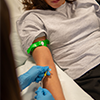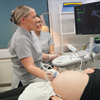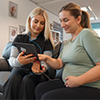Diabetes During Pregnancy; The Facts
There is an estimated 4 million people in the UK who have diabetes and if you’re one of them, you may be worried about pregnancy. This article will help you understand risks and take actions to help you have the most magical journey you can!
What is Diabetes?
Diabetes is a condition where the amount of sugar (glucose) in your blood is too high. Glucose comes from when your body is digesting starchy foods, like pasta, bread and rice. A hormone called Insulin, which is produced by your pancreas, helps your body change glucose to energy. There are 2 types of Diabetes.
Type 1 – Where the pancreas doesn’t produce insulin. This is normally a medical condition from birth.
Type 2 – Where the pancreas doesn’t produce enough insulin, or the body’s cells don’t react to insulin. This normally develops later in life, or during pregnancy.
Typical symptoms of type 1 diabetes are:
- Peeing more than usual, particularly at night
- Passing urine more often than usual, particularly at night
- Feeling very tired
- Weight loss and loss of muscle bulk
Symptoms of type 2 diabetes include:
- Peeing more than usual, particularly at night
- Feeling thirsty all the time
- Feeling very tired
- Losing weight without trying
- Itching around your vagina, or you keep getting thrush
- Cuts or wounds that take longer to heal
- Blurred vision
If you already have either type 1 or type 2 diabetes prior to pregnancy, you could be at higher risk of various things such as having a larger baby, miscarriage, induction or caesarean and heart/breathing problems after birth. If you have type 1, you may develop issues with eyes, kidneys or existing issues may worsen.
Now there are things you can do to massively reduce these risks, and having diabetes doesn’t necessarily mean you won’t have a wonderful pregnancy. To start, if having a planned pregnancy, the best thing to do is ensure you have your diabetes under control before you become pregnant. Ask your GP for the best advice on this and they will refer you to the right people to get the best treatment for you. You should be offered a blood test called an HbA1c test, which helps assess the level of glucose in your blood. What they will look for is the level being no more than 6.5% before being pregnant, as long as this does not cause problems with hypoglycaemia. If your levels are higher than this, your doctor will recommend you try control it more before you conceive.
Folic acid is a big yes during pregnancy, and women with diabetes should take higher doses of this. Your doctor can prescribe you higher dosage tablets that aren’t available over the counter. Taking folic acid helps prevent your baby from developing birth defects such as spina bifida. We recommend taking folic acid whilst trying to conceive, until you are around 14 weeks pregnant.
Your usual diabetic treatment may slightly change during your pregnancy, depending on your history and specific case. The key thing is to visit your doctor and midwife regularly, and keep them informed of any symptoms you have. This is so they can keep a close eye on both you and baby, and adjust your treatment accordingly. You will find that you will have your sugar levels checked more often, as well as your kidneys and eye sight.
If you have any concerns about dealing with diabetes during your pregnancy, contact your GP or midwife.













 Packages & Prices
Packages & Prices  Important Info & Policies
Important Info & Policies  Your Scan
Your Scan